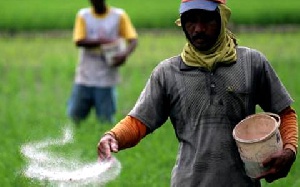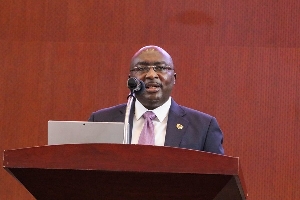- Home - News
- TWI News | TV
- Polls
- Year In Review
- News Archive
- Crime & Punishment
- Politics
- Regional
- Editorial
- Health
- Ghanaians Abroad
- Tabloid
- Africa
- Religion
- Election 2020
- Coronavirus
- News Videos | TV
- Photo Archives
- News Headlines
- Press Release
Business News of Wednesday, 18 October 2017
Source: thebftonline.com
Local organic fertiliser manufacturers demand market quota
Indigenous organic fertiliSer manufacturing companies have appealed for government to allocate a market quota of the agro-input to them so as to help sustain and grow their businesses.
The move, they said, would also help position Ghanaian farmers to produce more organic food crops in order to export to the yawning global organic market and enhance agriculture foreign exchange earnings.
Organic foods are the most sought-after worldwide; in Ghana most restaurants, hotels and malls have a high preference for organic food crops.
An international market research company, Organic Monitor, estimates that the global market for organic food reached US$81.6billion in 2015. The USA is the leading market with US$36.47billion, followed by Germany with US$10.50billion.
In an interview with B&FT, Akwasi Osei Bobie-Ansah - CEO of Farmers Hope, a Kumasi-based organic manufacturing company - said the domestic market for their products was doing fairly well until April this year, when the government rolled out its flagship ‘Planting for Food and Jobs’ programme.
“The inception of Planting for Food and Jobs has killed our business. Farmers are no more patronising our products because of the distribution of highly subsidised inorganic fertilisers by government. Under the programme, government has reduced the price of fertiliser by 50% and farmers are required to pay for 25% and settle the balance after harvest.
“Prior to the implementation of ‘Planting for Food and Jobs’, subsidised chemical fertilisers were selling at around GH¢80 per bag, while locally-produced organic fertiliser was GH¢50.
“We are not against ‘Planting for Food and Jobs’ but we want government to give us a quota in this subsidised programme so that we will remain competitive,” Mr. Bobie-Ansah said.
Benefits of using organic fertiliser
Aside from the potential to boost Ghana’s agro exports, the use of organic fertiliser has multiple benefits as compared to inorganic or synthetic fertilisers, he stated. Organic fertiliser usage ensures that farm produce is free from avoidable and harmful chemicals that are dangerous to the health of consumers, he added.
The raw material base of organic fertiliser is sourced from by-products of agriculture. Using the example of Farmers Hope, he revealed that the company uses cocoa pods, cocoa-bean shells, neem seeds, and rice husks among others for its fertiliser.
“Framers Hope can produce one million bags per year and create about 100,000 jobs, provided we have a guaranteed market,” he said.
Brief history of Farmers Hope
The company started production of organic fertiliser “Asaase Nofosuo” in 2010, mostly for smallholder farmers. After a few years the fertiliser was widely accepted by farmers, especially in the Ashanti, Eastern, Brong Ahafo and the Northern Regions.
It was subsequently assisted by the USAID Financing Ghanaian Agriculture Project (USAID FinGAP) to secure funding for machines to increase its production capacity from 600kg per day to 1.8 metric tonnes.
Currently, it has the capacity to produce about 80 metric tonnes per day, but marketing challenges have forced it to reduce production to around 10 metric tonnes, reaching out to over 4,000 smallholder farmers











